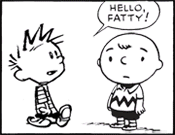|
Helsing posted:The money could simply be printed by the government without raising any new taxes to "pay" for it. Unless the economy is already at or close to full employment this wouldn't automatically lead to inflation, it might simply cause idle resources to be put to work to service this increase in demand. Or you could eliminate anti-poverty and welfare programs and convert that money to an equivalent cash payment, which is something a number of conservative commentators have advocated for. The UBI has a strong potential to be re-distributive in nature (and I think that would be a strength and not a weakness) but it's not true by definition that it redistributes anything. It really depends on the larger context in which it is implemented and the exact manner in which it is designed. It's fallacious to think that there's a fixed supply of money that the US government has to tax away from the population first before it can spend on programs. You cannot fund UBI through overt monetary financing without eventually doing redistribution, because if (at full resource utilization) the state doesn't cut spending when the private sector increases it, you get inflation. And the size of the UBI cannot adjust to private spending, since that would make no sense. So you would either shift part of the cost to taxes at that point, resulting in redistribution, or redistribute through inflation. I don't disagree with you on there being forms of redistribution that aren't desirable, that could also result from a badly designed UBI.
|
|
|
|

|
| # ? May 9, 2024 20:37 |
|
asdf32 posted:The existing tax structure is already makes it so rich people pay more dollars. Not as percentage of income or holdings, it doesn't.
|
|
|
|
call to action posted:Ah yes the classic "ignore the stats, you're above average!" It's that business failure is (mostly) not a random event so focusing on 70% or 90% as a summary figure is self defeating and not appropriate.
|
|
|
|
Helsing posted:The money could simply be printed by the government without raising any new taxes to "pay" for it. Unless the economy is already at or close to full employment this wouldn't automatically lead to inflation, it might simply cause idle resources to be put to work to service this increase in demand. Or you could eliminate anti-poverty and welfare programs and convert that money to an equivalent cash payment, which is something a number of conservative commentators have advocated for. The UBI has a strong potential to be re-distributive in nature (and I think that would be a strength and not a weakness) but it's not true by definition that it redistributes anything. It really depends on the larger context in which it is implemented and the exact manner in which it is designed. It's fallacious to think that there's a fixed supply of money that the US government has to tax away from the population first before it can spend on programs. So you're arguing with the "re" part of redistribution? Ok I can imagine scenarios when UBI doesn't subract income from rich people but it would increase purchasing power for poor people while reducing inequality. I thought that's the main point anyway. Though I'll grant another scenario where it wouldn't help: if it was paid for by cutting all existing services for the poor. Dr. Fishopolis posted:Not as percentage of income or holdings, it doesn't. US tax rates are mostly progressive until the very super rich. 
|
|
|
|
Kind of, although that chart also indicates that you pay the same effective rate at 75k and 300k, even though those are pretty radically different incomes.
|
|
|
|
asdf32 posted:US tax rates are mostly progressive until the very super rich. That's because the AMT has not been adjusted for inflation so there's an 'AMT zone' where you end up being subjected to the AMT in full and people that make more than it skate by with a lower effective rate.
|
|
|
|
asdf32 posted:US tax rates are mostly progressive until the very super rich. Your chart undermines your own argument. How is a tax rate that levels off around the 40th percentile and then drops four points at the 99th "mostly progressive"?
|
|
|
|
asdf32 posted:Ok I can imagine scenarios when UBI doesn't subract income from rich people but it would increase purchasing power for poor people while reducing inequality. It doesn't even necessarily do this, which is the point that I was making a few pages ago. Most of the "practical" forms of UBI that I've seen proposed are accompanied by cuts to social services, a reduction in the minimum wage, or both. If you assume that there's a fixed absolute minimum cost of living that very poor people meet through some combination of pay from low wage jobs and social service benefits, then a UBI with accompanying cuts elsewhere does nothing to reduce inequality unless it pushes their total income above that threshold. It also doesn't really do anything to increase purchasing power, since presumably you're still spending that money on whatever necessities were previously provided by other services. Paying for it with much higher tax rates on the rich would do it too, but that would reduce inequality even if you set the money on fire after you collected it. Paradoxish fucked around with this message at 17:57 on Apr 15, 2017 |
|
|
|
TheBalor posted:If things are so hosed that paper money becomes worthless, gold and silver will not be much better. Who is going to take this useless metal when US currency is no better than toilet paper? The local baron? The banker's guild? They have no more intrinsic value as a method of exchange than the institutions that supported them back in the day. How are silver and copper useless? Copper is pretty much the de-facto material used for the conducting part of wires used to move electricity. Silver is used extensively in semi-conductors. If things truly went to poo poo, I don't think silver would be that useful in a day to day sense. However, copper could still see a lot of use. (Pipes for drinking water in a post-plastic world.) There is also a 2000 year of history of using copper, silver, and gold as currency. Paper money has been around for... 300-400 years?
|
|
|
|
Senor P. posted:How are silver and copper useless? Copper is pretty much the de-facto material used for the conducting part of wires used to move electricity. Silver is used extensively in semi-conductors. They're not USELESS useless, as in they're going to turn into literal piles of granite rocks, but we're talking about a situation where the US government has collapsed to the point where paper money is no longer viable. In this situation, the societal decay has gone on to the point where you're looking for effective barter material and there will be people starving en masse. Why would your best item be stuff that has industrial applications? Are you going to trade 200 lbs of copper to the electric company for the heat staying on? It just doesn't seem like a useful strategy.
|
|
|
|
Most of the people hoarding precious metals for societal collapse would be better off hoarding their heart meds
|
|
|
|
Proud Christian Mom posted:Most of the people hoarding precious metals for societal collapse would be better off hoarding their heart meds Yeah, see, that's what I'm talking about. "I will trade you this wonderful material for industrial electronics in exchange for canned food" isn't as plausible as "I will trade you this box of life-saving medication that you can't get anymore for canned food."
|
|
|
|
Senor P. posted:How are silver and copper useless? Copper is pretty much the de-facto material used for the conducting part of wires used to move electricity. Silver is used extensively in semi-conductors. It's not that they're useless it's that you can't eat copper.
|
|
|
|
Copper can be worked into a pot still, which would be incredibly valuable.
|
|
|
|
I think the idea is not that the dollar becomes worthless but just weak and then you sell the silver and end up with more money than just eating the drop in value. The people who think society is going to implode are hoarding guns.
|
|
|
|
SHY NUDIST GRRL posted:I think the idea is not that the dollar becomes worthless but just weak and then you sell the silver and end up with more money than just eating the drop in value. I know anecdotes aren't data but I've got a client who is a no-poo poo prepper. Yeah, he hoards guns(mainly ammo) but he also hoards long term storage food, diesel and gold. Like every loving conversation starts with "Hello there XXX thanks for calling me back I was just busy watching the gold futures report". On the bright side he's also a gigantic ham radio nut and I've gotten to see some really amazing five figure+ setups he's done. Its a really fun glimpse into crazy, and he pays very well and on time.
|
|
|
|
Couldn't find a more appropriate thread for it, but Puerto Rico has declared bankruptcy: http://mobile.reuters.com/article/idUSKBN17Z1UC
|
|
|
|
tekz posted:Couldn't find a more appropriate thread for it, but Puerto Rico has declared bankruptcy:
|
|
|
|
cheese posted:Puerto Rico has been special-hosed for years now. John Oliver even did a full length segment on it last year on Last Week Tonight. Didn't they try to enact a VAT a couple years ago to get in the black then get cold feet and repeal it right before it took effect?
|
|
|
|
cheese posted:Puerto Rico has been special-hosed for years now. John Oliver even did a full length segment on it last year on Last Week Tonight. That clip didn't really go through the exact circumstances of the debt though - was there anything similar to the financial crisis where relatively manageable debt was ballooned up into something massive using hosed up financial instruments?
|
|
|
|
tekz posted:That clip didn't really go through the exact circumstances of the debt though - was there anything similar to the financial crisis where relatively manageable debt was ballooned up into something massive using hosed up financial instruments? Naw. Puerto Rico's economy has been on life support for a long time. This issue has been building for at least 30 years. edit: http://www.investopedia.com/articles/investing/090915/origins-puerto-rican-debt-crisis.asp This article talks about the origins of the crisis. wateroverfire fucked around with this message at 14:40 on May 4, 2017 |
|
|
|
tekz posted:That clip didn't really go through the exact circumstances of the debt though - was there anything similar to the financial crisis where relatively manageable debt was ballooned up into something massive using hosed up financial instruments? You need have to have money in the first place to spin up speculatory bubbles.
|
|
|
|
So question, in this thread's first post there's a video from Mark Blyth. He says that the reason the market is doing so well after the GFC is because that's the only place to put money to get a return better than inflation, and because that creates more scarcity of stock, it's simple Econ 101 that the market goes up. Does this mean that the current market is an inflated asset bubble that has to pop at some point? Or can it continue to rise even if other avenues for investment (like real estate or commodities) open up again as sensible places to put money?
|
|
|
|
Ccs posted:Does this mean that the current market is an inflated asset bubble that has to pop at some point? Or can it continue to rise even if other avenues for investment (like real estate or commodities) open up again as sensible places to put money? Yes, no or maybe. Who knows. It's an odd question because stock trading is necessarily speculative. Yes, it's an inflated asset bubble, but not really any more than it ever is. It can continue to rise as long as everyone agrees that it should, and then when something happens to spook the herd, it will crash again. There is no reasonable way to predict any of that unless you're the one manipulating the market. Real estate was only ever a "sensible place to put money" because it gave a consistent return, until it suddenly and dramatically didn't. You seem to be assuming that market activity is based on rational and organic decision making by investors. It's not.
|
|
|
|
Ccs posted:Does this mean that the current market is an inflated asset bubble that has to pop at some point? Or can it continue to rise even if other avenues for investment (like real estate or commodities) open up again as sensible places to put money? Most bankers/finance people I know believe that while the stock market is a bit overpriced it's nothing to be concerned about. And yeah their takeaway is the same- where else are you going to put it?
|
|
|
|
Well, I was hoping it was rising due to the "fundamentals" that people always talk about. Like our productivity has increased and is compounding so that's leading to awesome gains. As opposed to it being out of a sense of desperation to somehow beat inflation.
|
|
|
|
The obvious answer: cash, looking to skip the part where everything crashes and buy up poo poo at its low
|
|
|
|
So I'm seeing commercials for car sales offering 5 months of no payments... There's a massive bubble ready to pop here when it comes to car loans and this poo poo is only going to make things worse. It's insane.
|
|
|
|
ThisIsWhyTrumpWon posted:So I'm seeing commercials for car sales offering 5 months of no payments... Those have always existed. No payments till next year has always been super common when they're clearing off last year's models. Some dealers just figured out that they can basically offer the same thing before they cut prices in September and make out better.
|
|
|
|
Anubis posted:Those have always existed. No payments till next year has always been super common when they're clearing off last year's models. Some dealers just figured out that they can basically offer the same thing before they cut prices in September and make out better. Most people actually don't qualify for the things that car adverts promise anyway. Car dealerships are universally scammy as hell. That whole "no payments for six months! 0 money down! >1% interest!" only happens if you have pristine credit which of course most of us don't.
|
|
|
|
https://www.ft.com/content/23a59714-5813-11e7-80b6-9bfa4c1f83d2quote:Sale prices for second-hand private jets fall 35% postin dis just in case some of you are looking for a deal
|
|
|
|
The Atlantic recently posted an article about how the AHCA could lead to an economic recession by cutting thousands of jobs in the healthcare sector. How likely is it that a recession would occur? I consider the Atlantic a generally reliable source, but it just seems so insanely suicidal to me that the GOP would do this so I'm holding out some desperate hope. (Also: Can we change the year in the thread title?)
|
|
|
|
It's always possible, but the economy is a super chaotic system so no one actually ever knows for sure. We're probably due for one in 12-18 months.
|
|
|
|
Why 12-18 months?
|
|
|
|
FourLeaf posted:The Atlantic recently posted an article about how the AHCA could lead to an economic recession by cutting thousands of jobs in the healthcare sector. How likely is it that a recession would occur? I consider the Atlantic a generally reliable source, but it just seems so insanely suicidal to me that the GOP would do this so I'm holding out some desperate hope. Cutting a poo poo load of healthcare jobs like that would in fact be a bad thing but it isn't the AHCA itself that is going to cause a recession. It's the fact that the GOP is in charge that will.
|
|
|
|
Subjunctive posted:Why 12-18 months? Because we tend to get a recession every decade or so.
|
|
|
|
Pre-owned is a great euphemism.
|
|
|
|
readingatwork posted:Because we tend to get a recession every decade or so. The average time between recessions is actually less than that, so we're "due" basically anytime. Recessions don't just happen, though, something actually has to trigger a slowdown in growth that spreads through enough of the economy to check all the boxes.
|
|
|
|
Paradoxish posted:The average time between recessions is actually less than that, so we're "due" basically anytime. Recessions don't just happen, though, something actually has to trigger a slowdown in growth that spreads through enough of the economy to check all the boxes.
|
|
|
|

|
| # ? May 9, 2024 20:37 |
|
Grouchio posted:So you're implying that recessions can be predicted to an extent if you're smart enough? To an extent they can be but the markets can remain irrational longer than one can often remain solvent so it can be quite risky even if you notice all the right boxes being ticked.
|
|
|



































